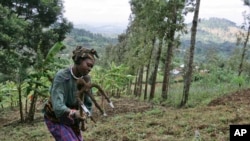Most African countries continue to face growing threats of hunger because they have not fulfilled their 2003 pledge to increase support for small-holder farmers, especially for women who do much of the farming on the continent.
In a report this month, the international aid agency ActionAid, warned African governments, that unless they provide more money for agriculture and make sure it goes to smallholder farmers, hunger will continue to increase across the continent.
The report “Walking the Talk,” highlights the failure of African countries in keeping their promise made ten years ago, under the 2003 Maputo Declaration, to devote ten percent of their national budgets to agriculture. And going forward they point out that while African governments have designated 2014 as the “Year of Agriculture and Food and Nutrition Security,” the true meaning of the phrase will remain empty unless they provide more money for agriculture.
“Ten years down the line, it is amazing to see that not more than about nine countries have been able to meet that declaration in terms of implementing those targets that were set, because the governments in Maputo said they would invest ten percent and anticipate that there would be six percent annual growth within the agricultural sector,” explained David Adama, coordinator of finance for agriculture for ActionAid in Abuja.
After examining the extent of government spending on agriculture in seven African countries, ActionAid found that for example, in Burundi, Ghana, Kenya, Rwanda, Uganda, Nigeria, and Zambia, it was found that none of these countries consistently met the ten percent spending target.
Unfortunately Adama said that countries are saying there are too many competing interests, such as military spending, for example.
Failure to meet those pledges impacts the small-holder farmers productivity significantly, said the ActionAid coordinator, who referenced a report by the United Nations Food and Agriculture Organization, FAO, on the potential of women farmers.
“This clearly points out that if women are given equal access to land, seeds, as their male counterparts, we can reduce hunger in the world by 140-million people, which is about 17% of people who are living hungry,” he explained.
Adama emphasized that the government needs to reprioritize public investment and focus on agriculture that benefits small-holder farmers.
In the same vain, small-holder farmers need to cooperate, with the help of civil society organizations, and farmer organizations, with the government. This involves becoming engaged in the policy making process, and making sure the government recognizes the need to include them in their budgeting and decision-making processes.
Adama said if small-holder farmers are engaged at this level, then even with the little money they are receiving from the government, their needs can still be met.
In a report this month, the international aid agency ActionAid, warned African governments, that unless they provide more money for agriculture and make sure it goes to smallholder farmers, hunger will continue to increase across the continent.
The report “Walking the Talk,” highlights the failure of African countries in keeping their promise made ten years ago, under the 2003 Maputo Declaration, to devote ten percent of their national budgets to agriculture. And going forward they point out that while African governments have designated 2014 as the “Year of Agriculture and Food and Nutrition Security,” the true meaning of the phrase will remain empty unless they provide more money for agriculture.
“Ten years down the line, it is amazing to see that not more than about nine countries have been able to meet that declaration in terms of implementing those targets that were set, because the governments in Maputo said they would invest ten percent and anticipate that there would be six percent annual growth within the agricultural sector,” explained David Adama, coordinator of finance for agriculture for ActionAid in Abuja.
After examining the extent of government spending on agriculture in seven African countries, ActionAid found that for example, in Burundi, Ghana, Kenya, Rwanda, Uganda, Nigeria, and Zambia, it was found that none of these countries consistently met the ten percent spending target.
Unfortunately Adama said that countries are saying there are too many competing interests, such as military spending, for example.
Failure to meet those pledges impacts the small-holder farmers productivity significantly, said the ActionAid coordinator, who referenced a report by the United Nations Food and Agriculture Organization, FAO, on the potential of women farmers.
“This clearly points out that if women are given equal access to land, seeds, as their male counterparts, we can reduce hunger in the world by 140-million people, which is about 17% of people who are living hungry,” he explained.
Adama emphasized that the government needs to reprioritize public investment and focus on agriculture that benefits small-holder farmers.
In the same vain, small-holder farmers need to cooperate, with the help of civil society organizations, and farmer organizations, with the government. This involves becoming engaged in the policy making process, and making sure the government recognizes the need to include them in their budgeting and decision-making processes.
Adama said if small-holder farmers are engaged at this level, then even with the little money they are receiving from the government, their needs can still be met.




